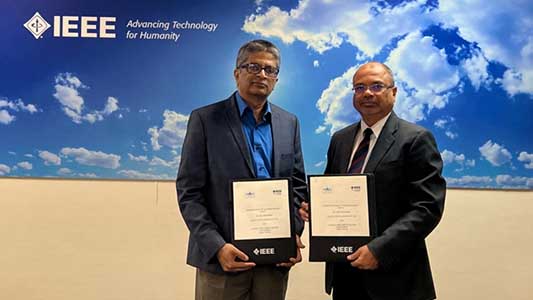SAN DIEGO and BANGALORE, India — Liquid Instruments has announced that it is partnering with Global IEEE Institute for Engineers (IEEE India) to develop exclusive tools, programs, and activities to increase technical capabilities for engineering students in India. The organisations will focus their efforts on workforce development, advocacy, and creating technical communities equipped with the latest test and measurement tools.
The company’s software-defined approach to test and measurement leverages the computational power of field-programmable gate arrays (FPGAs) to create highly versatile instrumentation for acquiring and analysing data, generating complex waveforms, and implementing closed-loop control systems.
With its flexible, FPGA-based Moku product line, Liquid Instruments is revolutionising the way that engineers, scientists, and students discover, create, and learn. The Moku product family consists of three all-in-one hardware options — Moku:Pro, Moku:Lab, and Moku:Go — that offer up to 12 software-defined instruments in one device. From essential tools like oscilloscopes and spectrum analysers to advanced tools like lock-in amplifiers and laser lock boxes, Moku products offer an entire test bench at a fraction of the cost.

IEEE is the world’s largest technical professional organization dedicated to advancing technology for the benefit of humanity. IEEE and its members inspire a global community to innovate for a better tomorrow through its more than 400,000 members in over 160 countries, and its highly cited publications, conferences, technology standards, and professional and educational activities. IEEE is the trusted “voice” for engineering, computing, and technology information around the globe. IEEE India Operations Centre with its focus on standards, technical activities, membership development, support for digital library customers and philanthropy programs, was established in 2010, with its office located in Bengaluru. IEEE India is developing educational programs under the umbrella of the IEEE Blended Learning Program (BLP), focused on training and skills development for both students and industry professionals.
IEEE Blended Learning Program is an indigenous, unique eLearning resources designed and developed by the IEEE volunteers and industry experts. Through the use of a blended-learning model which includes highly immersive e-learning combined with hand-on experience through workshops and use case based webinars, IEEE BLP offers skill-building courses in technology and allied courses to the needs of technical learners in academia and industry.
The partnership, outlined in a memorandum of understanding, will include private and government sector support to set up technical labs with Moku test and measurement equipment, as well as co-hosted seminars to benefit engineering students across India.
“We understand that knowledge, skills, and resources are critical to advance economic and industrial development in India,” said Pathy Iyer, Director of India Sales and Marketing at Liquid Instruments. “As the need for workers with high levels of technical and soft skills increases, we will continue to focus on advancing the know-how and growth of individuals in test and measurement.”
Sri Chandrasekaran, Country Head – IEEE India, echoed Iyer’s sentiments, emphasising Liquid Instruments’ dedication to improving engineering education for students by providing them with modern test equipment. “Liquid Instruments’ high technical competence and their FPGA-based, multipurpose instruments for academia, electronics, communications, and optics complement is well aligned with IEEE’s core objective and mission to advance engineering education standards in India,” Chandrasekaran said. “This collaboration will enable focused webinars and workshops which will not only enable students but also will be helpful in conducting focused FDPs (Faculty Development Programs) in India”, he added.
As the world’s largest professional society dedicated to the advancement of technical engineering, IEEE India is widely respected among university researchers, professors, and students.
“We are pleased to collaborate with IEEE India to develop activities to support the next generation of engineers,” Iyer said. “Universities and engineering students across India will benefit greatly from our activities with IEEE.”












